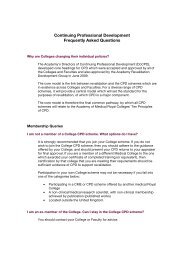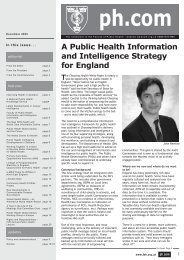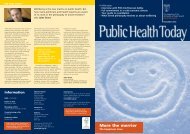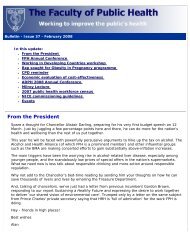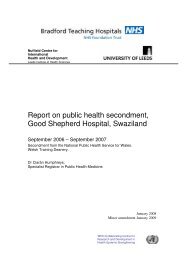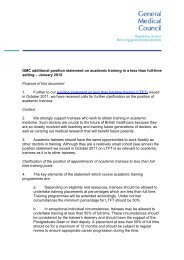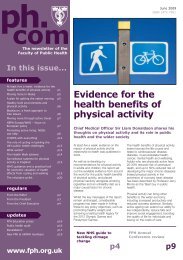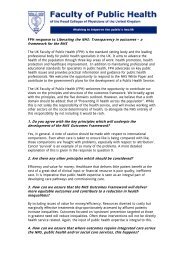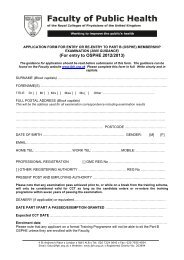A Chronology of State Medicine, Public Health, Welfare and Related ...
A Chronology of State Medicine, Public Health, Welfare and Related ...
A Chronology of State Medicine, Public Health, Welfare and Related ...
Create successful ePaper yourself
Turn your PDF publications into a flip-book with our unique Google optimized e-Paper software.
other doctors undertaking this work to have had special training. See 1976.<br />
1967 Cont 2<br />
1967 cont The Society <strong>of</strong> Medical Officers <strong>of</strong> <strong>Health</strong> published "The Doctor <strong>and</strong> the Child<br />
<strong>Welfare</strong> Centre" setting out the Society's views on the purposes <strong>and</strong> organisation <strong>of</strong> such<br />
centres.<br />
The Committee <strong>of</strong> Inquiry into the Relationship <strong>of</strong> the Pharmaceutical Industry <strong>and</strong> the<br />
National <strong>Health</strong> Service, Cmnd.3410, (chairman, Lord Sainsbury) considered that excessive<br />
prices had been charged for drugs; recommended that companies should provide annual<br />
financial returns to the Ministry <strong>of</strong> <strong>Health</strong>; <strong>and</strong> that a medicines commission should be set up.<br />
See 1968.<br />
The Committee on General Medical Services in the Highl<strong>and</strong>s <strong>and</strong> Isl<strong>and</strong>s,<br />
Cmnd.3257, (chairman, Lord Birsay), <strong>of</strong> the Scottish Home <strong>and</strong> <strong>Health</strong> Department, reviewed<br />
the current situation; made many recommendations, including the introduction <strong>of</strong> some<br />
salaried general practitioners; <strong>and</strong> criticised the over-centralisation <strong>of</strong> specialist services <strong>and</strong><br />
the tripartite administrative structure <strong>of</strong> the NHS. See 1968.<br />
A Committee <strong>of</strong> the Central Advisory Council on Children <strong>and</strong> Their Primary Schools<br />
(chairwoman, Lady Plowden) recommended that parents should be encouraged to be actively<br />
involved in their children's education; that there should be positive discrimination in favour<br />
<strong>of</strong> schools in deprived areas; more effort should be made to improve educational<br />
opportunities for the children <strong>of</strong> immigrants; that nursery education should be provided parttime<br />
for most children aged between 3 <strong>and</strong> 5; that medical examinations should be on a more<br />
selective basis; <strong>and</strong> that social workers should be attached to schools <strong>and</strong> education welfare<br />
<strong>of</strong>ficers should carry out wider social work functions. See 1980.<br />
The General Medical Council replaced its "Rules for Diplomas <strong>and</strong> Degrees in <strong>Public</strong><br />
<strong>Health</strong>" by "Recommendations ..." setting out broad headings <strong>of</strong> the required areas <strong>of</strong><br />
instruction instead <strong>of</strong> a detailed curriculum. The headings were: the quantitative sciences<br />
including medical statistics <strong>and</strong> epidemiology; behavioural sciences as applied to health<br />
including health education; genetic <strong>and</strong> environmental factors in health <strong>and</strong> disease including<br />
methods <strong>of</strong> prevention <strong>and</strong> control; <strong>and</strong> health services organisation including economics,<br />
evaluation <strong>and</strong> the principles <strong>of</strong> administration <strong>and</strong> management. See 1974.<br />
The World <strong>Health</strong> Organization published the proceedings <strong>of</strong> a Conference <strong>of</strong><br />
Directors <strong>of</strong> Schools <strong>of</strong> <strong>Public</strong> <strong>Health</strong> (Technical Report Series No.351). There was<br />
agreement that the basic postgraduate public health course should cover biological <strong>and</strong> social<br />
sciences in relation to public health; statistics <strong>and</strong> demography; epidemiology including<br />
survey <strong>and</strong> research methods; environmental health; health education; <strong>and</strong> administration <strong>and</strong><br />
management <strong>of</strong> health services, including their planning <strong>and</strong> evaluation. In addition, training<br />
should include a period <strong>of</strong> supervised field experience <strong>and</strong> some experience <strong>of</strong> research work.<br />
See below <strong>and</strong> 1969.<br />
The Nuffield Provincial Hospitals Trust published the reports <strong>of</strong> three working parties<br />
on vocational training for general practice, for the psychiatric services <strong>and</strong> for the<br />
administration <strong>of</strong> hospital <strong>and</strong> public health services. The report <strong>of</strong> the third working party<br />
commented that medical administrators "must work on two pr<strong>of</strong>essional levels, as specialists<br />
in the medicine <strong>of</strong> the group <strong>and</strong> in relation to the community at large, <strong>and</strong> also as<br />
administrators". It recommended common training for doctors on the staff <strong>of</strong> the regional<br />
hospital boards, in the public health services <strong>and</strong> in central government health departments<br />
consisting <strong>of</strong> practical experience <strong>and</strong> an academic course together extending over a<br />
minimum period <strong>of</strong> two years. See 1968 <strong>and</strong> 1972.<br />
"Sans Everything: A Case to Answer", compiled by Barbara Robb for Aid for the



